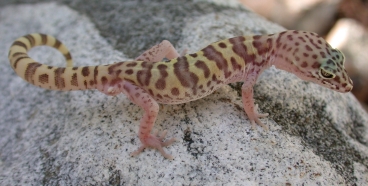|
|
 |
Present Address: Biologist Aspen Environmental Group 30423 Canwood Street, Suite 215 Agoura Hills, California 91301-4316, USA Email: jennifer@lancasterbiology.com |
|
|
 |
Present Address: Biologist Aspen Environmental Group 30423 Canwood Street, Suite 215 Agoura Hills, California 91301-4316, USA Email: jennifer@lancasterbiology.com |
Thesis Research
The formation of social aggregations is widespread in animals and is known to have important social, ecological, and fitness implications. I examined the mechanistic basis of diurnal grouping behavior in nocturnal lizards as it pertains to retreat-site selection. My study species was the western banded gecko, Coleonyx variegatus, a small lizard that is known to group in retreat sites. Temperature and moisture preferences are expected to be particularly important to Coleonyx because they live in hot, dry environments (deserts of southwestern North America), yet have relatively low temperature preferences and high rates of evaporative water loss compared to other desert lizards. Banded geckos avoid environmental extremes by restricting activity to nighttime and by using insulated retreats by day. Because these geckos presumably select retreat sites based on needs for specific abiotic conditions, suitable retreats may be rare. Consequently, aggregation may be an incidental result of attraction to a rarely occurring resource rather than for conspecific attraction. My study sought to determine the variables that influence aggregation in these geckos. I found that geckos grouped in the laboratory and that grouping was not likely for social reasons (e.g., no successful breeding took place). Geckos did not group when exposed to the olfactory and visual cues of a known predator, perhaps to avoid concentrating their scent. When placed in groups, geckos experienced lower rates of evaporative water loss, but not because they reduced their effective surface-area-to-volume-ratio, but because their breathing increased the relative humidity of their retreat chamber. My results provide a model for the evolution of social systems: once organisms begin grouping for physiological benefits, the stage is set for the evolution of more complex social behaviors.
Download a copy of my full research proposal here [Weist MS Thesis Proposal].
 |
Awards and Honors Research Funding Professional Presentations
Peer-Reviewed Publications
Why do banded geckos group? Testing the benefits of aggregation in Coleonyx variegatus.
Is diurnal aggregation socially mediated in nocturnal lizards?
Is diurnal aggregation in banded geckos (Coleonyx variegatus) socially mediated or the result of rare retreats?
Diurnal aggregation as a function of microhabitat selection in the western banded gecko (Coleonyx variegatus).
Is diurnal aggregation socially mediated in the western banded gecko (Coleonyx variegatus)?